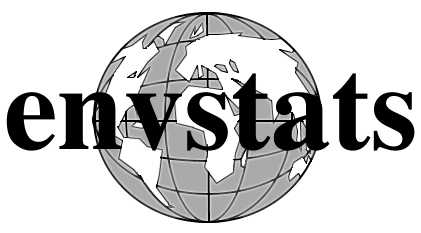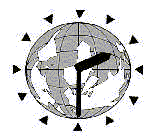
|
****JavaScript based drop down DHTML menu generated by NavStudio. (OpenCube Inc. - http://www.opencube.com)****
|
|
|
NEWS
from the Issue 7 August 1999 - December 1999 EDITORIAL The
London Group Coordinating Committee The SEEA-2000 SEEA-2000 is the proposed name for the revised UN handbook Integrated Environmental and Economic Accounting, commonly referred to as the SEEA. This editorial is to explain the revision process and invite participation in the process from a wide audience of experts interested in environmental accounting. The SEEA revision process started in 1997, when the Statistical Commission, at its 29th session, requested the London Group on Environmental Accounting to participate in the revision of the interim SEEA handbook published in 1993. In 1998, at the London Group meeting in Fontevraud, France, the Group agreed on a broad outline for the SEEA-2000 handbook, established working groups and coordinators to prepare draft chapters. The draft chapters and the revision process were discussed at the London Group meeting held in Canberra, Australia from 15-19 November 1999. SEEA-2000 will be an internationally agreed handbook of best practices and not an international standard. It will:
The London Group's final draft of SEEA-2000 will, after international consultation, be submitted as a room document at the Statistical Commission's meeting in early 2001. Upon the Commission's approval of the revision process and following any final revisions, the SEEA-2000 handbook will be jointly published by UN, OECD, Eurostat and the World Bank in mid 2001. The London Group and the SEEA-2000 co-sponsoring organizations recognize the need to consult and communicate with the broader international community throughout the SEEA revision process. Six additional countries from Latin America and Asia were invited to join the London Group as permanent members in 1999. With the addition of these new members, the London Group now includes the most active countries and international organizations in environmental accounting around the world. Thus, many of the international stakeholders likely to have a strong interest in SEEA-2000 are directly involved in its production through the London Group. In order to make the revision process as open and transparent as possible a consultation and communication strategy was developed by the Group. The strategy includes the following major steps:
All interested
parties are invited to provide comments on the various drafts. This will
ensure that the final document will be an internationally agreed manual
of best practices. Instructions for submitting comments will be available
on the London Group web site. 1 http://ww2.statcan.ca/citygrp/london/london.htm
WHAT?
The overall objective of the project is to support regional capacity building in various aspects of the global programmes and platforms of action, especially in relation to the follow-up to United Nations conferences. In particular, the statistics component seeks to strengthen intra-regional cooperation among regional and national statistical systems with a view to developing a critical mass of statisticians in selected fields (environment, social and gender statistics), within the region. As a first step to designing a programme of work for the region, the United Nations Statistics Division (UNSD) and the CARICOM Secretariat carried out missions to selected countries in August and September 1999 to determine the statistical needs in the areas of environment, social and gender, and in information technology. The missions discussed with the national statistical offices and other relevant institutions, ongoing statistical activities, specific data requirements and gaps with respect to the Beijing, Copenhagen, Cairo and Rio conferences and strategies for addressing them within the specified objectives of the statistics programme. Based on the findings of the missions UNSD has drawn up a draft implementation plan for the project. The draft plan will be presented to the next meeting of the Standing Committee of Caribbean Statisticians (SCCS) scheduled to be held in January 2000. The plan identifies specific activities that will be undertaken in the context of the project objectives and the proposed timing of the activities. The project is expected to be completed by the end of 2001. Questionnaire on Environmental Statistics and Indicators In early 1999, UNSD circulated the Questionnaire on Environmental Statistics and Indicators to 170 national statistical services of United Nations member states, territories and areas (excluding OECD member states). The Questionnaire contains 15 environmental indicators not collected by other international organisations. Sixty-six responses were received (approximately 40%) out of which 42 were questionnaires containing data (about 24%). None of the returned questionnaires were fully completed; most contained only partial data or marginal information. Some countries sent their environmental compendia in lieu of data, others forwarded the questionnaires to other institutions for response. Based on brief informal discussions with a number of the representatives of developing countries participating in the recent Expert Group Meeting on Environmental Statistics and Indicators (New York, 27 September - 1 October 1999), the reasons for the low response rate are manifold: few established environment statistics programmes, dearth of basic environment statistics, lack of time series, poor coordination between institutions responsible for environment statistics, and classification and definitional problems. It is hoped that future data collection efforts will be more successful as environment statistics programmes at national level become more centralized or better coordinated, enabling UNSD to harvest timely information. This process might be hastened when the Manual of Environment Statistics now being prepared by UNSD (see below) becomes available and with increased capacity building at national level. Manual of Environment Statistics The Manual of Environment Statistics initially had been planned as a practical handbook for the compilation of 50 environmental indicators selected by the Intergovernmental Working Group on the Advancement of Environment Statistics for international data collection. The pilot data collection exercise carried out by UNSD in the first half of 1999, the testing exercise of the UN Division of Sustainable Development on its indicators as well as regional surveys in environment statistics, revealed that many countries still did not have established and institutionalized basic environment statistics. In response to this, UNSD, after revising the original approach, redirected the draft Manual accordingly, concentrating on how to start, develop and maintain an environment statistics programme as part of a national statistical system. An Expert Group Meeting was convened by UNSD to discuss the first draft of core chapters of the Manual. The experts (from 15 countries and 8 international organizations) who gathered in New York between 27 September and 1 October 1999 welcomed the change in the focus of the Manual. They agreed that before going into sophisticated ways of aggregating, analyzing and presenting information, more practical guidance for the development of basic environment statistics is needed in many parts of the world. They recommended that the Manual be developed into a kind of "technical toolbox" that would assist countries in establishing their environment statistics programmes. The experts also identified several subject areas to be covered by the Manual at a later stage. Since this type of practical guidebook has been long overdue, the meeting suggested that instead of aiming at a complete publication, the Manual should be published in separate volumes as soon as comprehensive sets of revised and finalized chapters become available in order to facilitate the quickest possible dissemination. UNSD, with the continuing assistance of expert consultants, plans to finalize and submit for publication the first volume of the Manual in the second half of 2000. This volume will cover the basics of environment statistics and statistics on emissions to and quality of the environmental media. Draft chapters will be put on UNSD's environment statistics website immediately upon their availability. WHO?

Léon Tromp has been with Statistics Netherlands since 1982 holding various positions, all in the field of statistical integration. Since 1992 he has been involved in an ESCAP project on the development of environment statistics. As a consultant, he has been assisting UNSD in drafting the Manual on Environment Statistics. Furthermore he is involved in the EU MEDSTAT project. Within the framework of the UN Internship Programme, Ms. Susan Kofoed from the University of Copenhagen, Denmark assisted UNSD from September to November 1999 in its work on environmental statistics and indicators. Eszter Horvath, former Chief of the Environment Statistics Section, has recently been appointed Chief of the Environment, Energy and Industry Statistics Branch of UNSD. WHEN AND WHERE?
Second OECD Expert Workshop to Measure Sustainable Development (Paris, 2-3 September 1999). The Workshop reviewed the state of progress on developing frameworks and indicators to measure sustainable development and examined the policy questions that can be answered using the different approaches to measuring sustainable development. A staff member of UNSD presented a paper on the uses of the SEEA as a framework to measure the interaction between the economy and the environment. Working Group "Statistics of the Environment" and Working Party "Economic Accounts for the Environment" (Luxembourg, 16-17 September 1999). The Meeting discussed the work programme of Eurostat in the area of environment statistics, indicators and accounting. A UNSD staff member presented the workprogramme of UNSD Environment Statistics Section and the results of the international Workshop on the SEEA compilation (New York, 7-11 June 1999). Meeting on Accounting for Environmental Depletion (Paris, 20 September 1999). The meeting, the second on the topic, was organized by OECD. Classification and recording of discoveries of sub-soil assets and valution issues were discussed. A UNSD staff member participated in the meeting. ECA Workshop on Environmental Statistics, Indicators and Accounting (Addis Ababa, 1-5 November 1999). The workshop was organized by ECA to familiarize data users and producers in the francophone countries in the region with the concepts and methods of environmental statistics, indicators and accounting, and to provide a forum for exchange of information on the status of national environment statistics. UNSD provided a resource person to the workshop to present international work in the area of environmental statistics and indicators.. International Workshop on CSD Indicators of Sustainable Development (Barbados, 7-9 December 1999). The Division for Sustainable Development and the Government of Barbados organized the above-mentioned workshop whose purpose was to conclude the three-year voluntary national testing process of the CSD indicators of sustainable development. The participants decided that while this was the final meeting of the countries during the formal testing phase, work on the CSD indicators would continue both at the national and international level. The goal of the CSD work programme is to make available to the ninth session of the CSD in 2001, a core set of indicators and related methodologies as a supporting tool for national decision-making. UNSD provided a resource person to the workshop to present UNSD's activities in the field of environment statistics and the experience gained from the first compilation of environmental indicators from national statistical services.
by Léon Tromp In Envstat Issue 6, Anthony Friend lashed out at 'quick fixes' in the development of environment statistics. I quite enjoyed his Viewpoint, because he defends his views in clear terms (although the alternative he offers seems a bit hazy). I share his concern about all kinds of UN efforts related to environment statistics going on without much co-ordination. Myopia is, I fear, not unique to the Statistical Commission. That little progress has been made by UNSD in the field of basic environment statistics, may largely be contributed to the fact that in the past accounting was given precedence. Now that the London Group is well underway, and the 'Nairobi Manual' is available for use, more attention might be devoted to basic statistics, including its relation to indicators and accounting, and the broader framework of sustainable development. After all, without basic data, reliable indicators and accounts seem quite illusory. Each country has to develop a framework (of statistics and/or indicators) adapted to its own needs and uses (and with a keen eye to international data needs and future developments). In many cases this means that countries use internationally agreed methodologies, or have a serious look at definitions, classifications and methods developed elsewhere. A statistician who fails to take stock of what has been done already in the field, before embarking on his own trail, is at risk losing time, inventing the wheel anew, in short: delaying the delivery of badly needed data. This means that developing countries should take note of what has been done by developed countries. That is not to say: copy or simplify, as definitions, classifications and other methodology may not be applicable or appropriate, given the circumstances in the country or the possibilities for the statistical service. Therefore, the Manual of Environment Statistics currently being developed by UNSD, tries to be an operational toolbox, bringing together in an ordered and digestible form, what has been done so far, and making suggestions on what may be done, and in what general order. Where surveys are not possible, data may for example be computed using existing economic data. Though the latter data may be less precise than survey data, they may suffice under the current environmental policies. In the course of time, when more accurate and detailed data are needed, the statistical service may be able to deliver the matching data. The Manual also tries to address circumstances typical for developing countries, by offering approaches to address them in the statistical system. An example may suffice: some effort was put in describing the importance of the informal sector in waste recycling in developing countries. As to indicators, there is an obvious need for them, though they seem being developed without the necessary linkage to Environmental Policy Plans, their point of attachment in the individual countries. I see the point in, say, the OECD indicators, an effort to bring together statistics considered as core data for the OECD countries, who are all in the same stage of (over-) development. From a statistician's point of view, some of the Indicators of Sustainable Development (the "Blue Book") seem to float a bit too high in the air for his comfort, as - in a professional reflex - she will ask: How do we measure the basic data to construct this indicator? And in many instances, no comforting answer comes up (as yet). Still, the Blue Book is a show case of the ambitions to have data on pertinent subjects. In this sense, the Blue Book, just like Accounting approaches, can act as a strong guiding light for work to be done by statisticians to provide reliable basic data. The deeper reason for Friend's criticism seems to be that he strives at an all encompassing systems view of the relations between all that goes on on Planet Earth (and beyond, maybe). It even has to be 'seamless'! Now, looking forward as far as possible is a good thing; we need those people. But he seems to wish to skip the painstaking work to lay out a solid groundwork, like a builder who - in order to gain time - starts putting up a building right away from the second floor on. I would say, for the moment we should stick to ground level, where the humble labour on the Manual is mostly done. This is where the most pressing needs to construct timely & reliable environment data have to be met. If and only if we have tidied up that place a bit, I would be prepared to join Tony Friend in a flight towards the Sun. (This reaction is the personal view of the author). Note of the Editor The "Point of View" column serves as a forum for individual opinions about hot issues in environment statistics. Its aim is to initiate discussion. Your comments on the role of environment statistics and that of the UNSD is solicited and appreciated. Please send them to the address below.
|
||||||



 UNSD/CARICOM project
The United
Nations has recently approved a project for "Strengthening Capacity
in the Compilation of Statistics and Indicators for Conference Follow-up
in the CARICOM Region". The project seeks to address, inter alia,
the concern raised by a special panel session of the Economic and Social
Council (ECOSOC), that there is a need to strengthen the capacity of countries
to produce basic data routinely.
UNSD/CARICOM project
The United
Nations has recently approved a project for "Strengthening Capacity
in the Compilation of Statistics and Indicators for Conference Follow-up
in the CARICOM Region". The project seeks to address, inter alia,
the concern raised by a special panel session of the Economic and Social
Council (ECOSOC), that there is a need to strengthen the capacity of countries
to produce basic data routinely.
 Whither
Environment statistics?
Whither
Environment statistics?